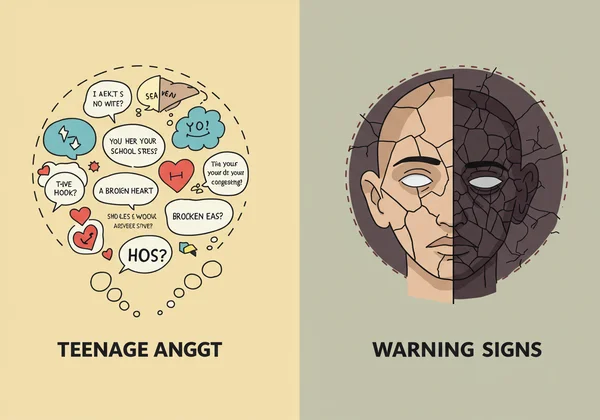Schizophrenia Test for Teens & Young Adults: Recognizing Early Signs
Are you noticing subtle, unsettling changes in a teenager or young adult you care about—or even in yourself? It's natural to feel worried or confused. Schizophrenia, a complex mental health condition, often begins with gentle shifts in thinking, feeling, and behavior during adolescence or early adulthood. Recognizing these early signs of schizophrenia test indicators is crucial for getting timely support. How does schizophrenia start off? It often begins not with a sudden break, but with a slow, quiet drift from one's usual self. This guide will help both individuals and concerned parents understand what to look for and the vital first steps to take.
Feeling isolated or overwhelmed by these concerns? You're not alone. The first step towards clarity and help begins with understanding these early warning signs. For a confidential way to explore these symptoms, you can get preliminary insights on our platform. Our goal is to provide a safe, private space to organize your thoughts and feelings.

Recognizing Key Early Signs of Schizophrenia in Youth
The early, or "prodromal," phase of schizophrenia can be challenging to identify. Symptoms are often mistaken for typical teenage moodiness or the stress of entering adulthood. However, they tend to be more persistent and cause a noticeable decline in a person's ability to function. Knowing these patterns is essential for anyone considering a teenage schizophrenia test.
Subtle Behavioral Shifts: Early Signs in Teens & Young Adults
One of the most common schizophrenia warning signs is a gradual loss of interest and motivation. A once-social teenager might start avoiding friends, or a diligent student's grades may begin to slide without a clear reason. You might notice significant changes in routine, such as neglecting personal hygiene, changes in sleep patterns (sleeping far too much or too little), or abandoning hobbies they once loved. These shifts aren't about laziness; they can be signs of the profound cognitive and emotional effort it takes to simply get through the day.
Cognitive & Perceptual Shifts: Disordered Thinking & Communication
This is where the internal experience begins to change. An individual might develop disordered thinking, making it hard for them to connect thoughts logically. Their speech may become vague, disjointed, or difficult to follow. They might also develop strange perceptions, such as feeling that colors seem brighter or sounds are louder than usual. Some may express unusual or suspicious ideas, like feeling they are being watched or talked about. These are not just quirky personality traits but potential indicators that warrant gentle attention and exploration. If these experiences sound familiar, a confidential take our online self-assessment can be a helpful tool.
Social Isolation & Apathy: Beyond Normal Teen Shyness
While many teens go through shy or awkward phases, the social isolation associated with early schizophrenia is different. It's often accompanied by a flatness of emotion, where the person seems indifferent or has a reduced range of emotional expression. This can be described as apathy in teens, where they show little interest in exciting or sad news. They may withdraw from family and friends not out of anger, but because social interaction becomes overwhelming and confusing. This emotional blunting is a key sign that distinguishes it from typical adolescent introversion.

Distinguishing Early Schizophrenia Signs from Adolescent Moodiness
One of the greatest challenges for parents and loved ones is telling the difference between normal adolescent mental health struggles and the early signs of a more serious condition. Every teenager is moody at times, but a persistent pattern of concerning symptoms is different. It’s important to trust your instincts when you feel something is truly wrong.
Distinguishing Normal Development from Concerning Symptoms
How can you tell the difference? The key factors are duration, severity, and the impact on functioning. A teen having a bad week after a breakup is normal. A teen who, for six months, has been increasingly isolated, suspicious, and unable to keep up with schoolwork is showing signs that need attention.
-
Teenage Angst: Often linked to specific events, comes and goes, and the person can still function in key areas of life like school and friendships, even if there are struggles.
-
Warning Signs: Persistent and worsening over time, not tied to a clear cause, and leads to a significant drop in performance at school, work, or in social relationships.

The Crucial Role of Early Intervention for Schizophrenia
Identifying these signs early and seeking help can dramatically improve a person's long-term schizophrenia prognosis. Early intervention can help manage symptoms, reduce disruptions to school and relationships, and provide the person and their family with crucial coping skills. The benefits of early treatment are well-documented and empower an individual to lead a fuller, more productive life. Taking action isn't about jumping to conclusions; it's about opening the door to support. Getting an initial idea of what's happening is a powerful first step, and a take a free schizophrenia test can provide that first piece of the puzzle.
Taking the First Steps: What to Do Next If You're Concerned
If this guide resonates with you, it's natural to feel a mix of validation and anxiety. The most important thing to remember is that there is a clear path forward. You can take supportive, practical steps to address your concerns in a calm and constructive way.
How to Talk to a Young Person About Mental Health Concerns
Starting a conversation is often the hardest part. Here are some mental health conversation tips for supporting a struggling teen or young adult. Choose a private, calm moment. Speak from a place of love and concern, not accusation. Use "I" statements, such as "I've noticed you seem more withdrawn lately, and I'm worried about you," instead of "You're acting strange." The goal is to express your support and create a safe space for them to share their experience without feeling judged.
Using a Preliminary Schizophrenia Test Online for Insights
For both worried individuals and concerned supporters, a preliminary schizophrenia test online can be an invaluable tool. It offers a structured, private way to assess experiences and see if they align with the prodromal symptoms of schizophrenia. It is not a diagnostic tool, but rather a way to gather information and clarity.
Our free, confidential schizophrenia assessment test is based on the Prodromal Questionnaire, a scientifically recognized method for identifying early risk factors. Answering the questions can help you organize your thoughts and provide a clearer picture to discuss with a healthcare professional. It’s a pressure-free way to take the first step toward understanding.

Taking the First Step Towards Clarity and Support
Recognizing the early signs of schizophrenia in a young person or in yourself is a courageous act. It requires paying attention to subtle shifts and trusting that feeling that something isn't right. Remember, these signs are not a diagnosis, but they are a clear signal that it's time to seek more information and support.
Empower yourself with knowledge. Knowing what to look for can transform worry into proactive support, paving the way for understanding and healing. If you are ready to gain some clarity in a safe and private setting, begin your self-assessment today. It’s a brave and important first step toward understanding, help, and healing.
FAQ Section
Here are answers to some common questions about identifying early signs of schizophrenia in youth.
How do I tell if I'm schizophrenic, or if someone I know is?
Ultimately, only a qualified medical professional, like a psychiatrist, can provide a diagnosis. The first step for you is to observe and document the changes in thoughts, feelings, and behaviors. A preliminary screening like a Do I have schizophrenia test? can be a helpful way to structure your concerns. You can use the results from a tool like our confidential schizophrenia test as a starting point for a conversation with a doctor.
What are 5 common early signs of schizophrenia in youth?
While symptoms vary, five common early warning signs include:
- Significant Social Withdrawal: Losing interest in friends and social activities.
- Decline in Functioning: A noticeable drop in grades or performance at work.
- Disorganized Thoughts or Speech: Difficulty communicating ideas clearly.
- Growing Suspicion or Paranoia: An unusual distrust of others.
- Emotional Blunting: A marked decrease in emotional expression or responsiveness.
What types of tests confirm a schizophrenia diagnosis?
There is no single blood test for schizophrenia or brain scan that can diagnose the condition. A diagnosis is made by a mental health professional after a comprehensive psychiatric evaluation. This includes detailed interviews about symptoms and personal history, observation of the person's behavior, and ruling out other medical or psychiatric conditions that could cause similar symptoms. An online screening tool like our schizophrenia test free of charge is designed to be an informational first step, not a substitute for this essential professional assessment.